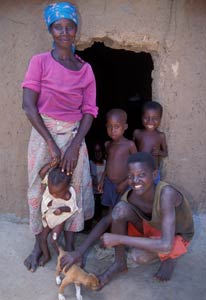NIH, Wellcome Trust to fund genetic studies in Africa
July / August 2010 | Volume 9, Issue 4

Photo by Curt Carnemark/World Bank
NIH and the Wellcome Trust are
providing $37 million for genetic
studies in Africa, by African
scientists, to learn more about
common, noncommunicable
disorders.
NIH and the Wellcome Trust, a global charity based in London, have announced a partnership that will provide more than $37 million for genetic studies in Africa. The research focus of the Human Heredity and Health in Africa project, or H3Africa, will be on common, non-communicable disorders such as heart disease and cancer, as well as communicable diseases including malaria. African scientists will conduct the research.
"H3Africa will be fundamentally different than previous investments in medical research in Africa," says Dr. Charles Rotimi, director of the NIH Center for Research on Genomics and Global Health. "In the past, many research projects took samples from Africa and conducted the studies back in Western labs. H3Africa will build the capacity for African researchers to study African populations to solve African problems."
NIH will provide $5 million each year for five years starting in FY 2011, which begins Oct. 1. In addition to committing at least $12 million over the next five years, the Wellcome Trust will provide administrative assistance, advanced training and scientific consultation. In-kind support will come from the African Society for Human Genetics. The National Human Genome Research Institute will manage H3Africa on behalf of the NIH Common Fund.
Research suggests that populations in Africa have greater genetic diversity than populations in Europe and Asia. The project may identify rare genetic variations that could lead to advances in diagnosis and treatment.
More Information
To view Adobe PDF files,
download current, free accessible plug-ins from Adobe's website.